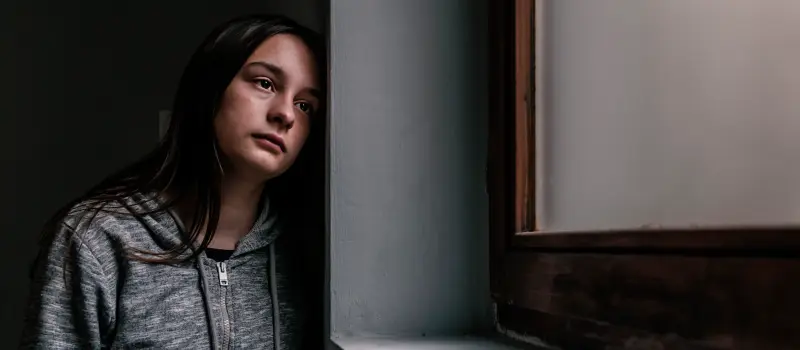
Table of Contents
Why You Can’t Remember Your Childhood, According to a Therapist

Written By: Sarah Fielding

Clinically Reviewed By: Meghan Jensen
November 13, 2024
5 min.
Childhood trauma can be to blame for why you can’t remember early memories. In therapy you might be able to access them safely.
Learn more about our Clinical Review Process
Table of Contents
Memory is a fickle thing. It’s easy to misremember things or forget them all together throughout life. In childhood, especially, we’re all just coming online, in a sense, for the first time, with researchers estimating that a person’s earliest memories can start at two-and-a-half years of age. That age can go up based on the person, but, notably, research has found that individuals often believe they were older when a childhood memory occurred than they were in actuality.
At the same time, there may be specific circumstances that affect why someone can’t remember their childhood. They might recall certain bits in detail but hit a wall when thinking about specific periods or if another person brings up a shared experience. Not remembering a childhood memory is common, with many possible factors to blame, including past trauma. Read on to learn why you can’t remember your childhood, according to experts.

We offer support for childhood trauma
Virtual, intensive mental healthcare from the comfort of your home.
Why can’t I recall my childhood?
“There are a lot of different reasons why someone may not remember aspects of their childhood,” says Charlie Health Clinical Supervisor Sarah Lyter, LCPC, MA. A person might not recall or be able to properly interpret parts of their childhood due to age, developmental factors, trauma, and mental health disorders. Here are some key factors to consider if you struggle to recall your childhood:
1. Trauma
Trauma from an early experience is one of the most significant reasons a person might not remember their childhood. This childhood trauma could be something they’re aware of or something that their mind has blocked out. “Our brains do a great job of protecting ourselves from things that are too distressing to process, and sometimes traumatic memories will be repressed for that purpose,” says Lyter.
Trauma is painfully common as an early experience for young people. According to the Substance Abuse and Mental Health Services Administration (SAMHSA), about two-thirds of children experience at least one traumatic event by the time they are 16 years old. Childhood trauma can include:
- Abuse including physical abuse, sexual abuse, neglect, or emotional or psychological abuse
- Violence at home, school, or in the community
- National disasters
- Terrorism or refugee or war experiences
- Sudden or violent loss of a loved one
- Separation from a parent due to their injury or deployment
- Severe accidents or illness
Again, these are frighteningly regular instances. According to the Centers for Disease Control and Prevention (CDC), at least one in seven children experienced abuse or neglect over the last year. These rates are five times higher for families of low socioeconomic status than those of high economic status. This increase could be due to factors such as the stress poverty places on the family unit.
Experiencing trauma can have a range of impacts on memory, including fragmented or disjointed memories, explains Lyter. “It can also cause hyperarousal, which increases stress hormones like cortisol and adrenaline, which can impact our ability to remember things,” she adds. “Dissociation, repression, and suppression are also common and impact our memories.”
Lyter further explains that experiencing chronic or continued trauma can change how the brain is structured. These effects can impact areas like the amygdala, hippocampus, and prefrontal cortex — each of which is associated with memory.

2. Other mental health conditions
Mental health disorders that result from trauma or other factors can also have a negative impact on memory, Lyter explains. These potentially impactful conditions include anxiety disorders, depressive disorders, and post-traumatic stress disorder (PTSD).
Take the latter, for example. According to the National Center for PTSD states, “PTSD can occur when an experience is inadequately processed and is consequently stored dysfunctionally. The original, often fragmented perceptions of the stressors are not integrated with other memories, but rather held separately in a state-specific form with the original distress, making it difficult to resolve the distress.”
Research has found that both anxiety and depression can both impact recall and working memory performance.
3. Infantile amnesia
In some cases, a person will experience infantile amnesia, also known as childhood amnesia. Infantile amnesia is when someone can’t remember anything from the first few years of their life and can only remember limited things before the age of 10 or so. This condition can occur due to slower or limited brain development as a child.
Can childhood memories be recovered? And if so, how?
In short, yes — but it might be challenging. In the case of mental health disorders, trauma, or a combination of the two, there might be a very serious reason why you don’t remember something. Yes, you can possibly recover a memory, and unlocking it could potentially provide understanding and closure. However, it can also be a traumatic experience in and of itself.
Trying to access your memories can be a long process that is best done in a safe space like therapy. “Exploring these issues in therapy can help with processing and bring some memories to the forefront,” says Lyter. “Guided imagery or visualization techniques can also be used to attempt to elicit memories, as well as journaling. Somatic-based therapies can also be instrumental in this process.” You might learn about traumatic experiences you had previously blocked out — consciously or not — and the painful memories of a past event, abuse, or whatever occurs in the repressed memory can be very heavy to process on your own.
Lyter also recommends exploring techniques specifically tailored to trauma, such as eye movement desensitization and reprocessing (EMDR) or brain spotting. Mental health professionals commonly use EMDR for treating post-traumatic stress disorder (PTSD). Brain spotting is another form of psychotherapy that focuses on spots in the visual field to access and process trauma.
It can feel incredibly frustrating not to remember things and struggle to access them. “It’s important to be patient with yourself and kind to yourself when you’re experiencing memory difficulties,” says Lyter. “Remember, your brain is trying to help you and protect you, so have empathy for yourself and be patient with this process.”

How Charlie Health can help
Charlie Health offers a virtual Intensive Outpatient Program (IOP) that provides individuals with the resources and support they need to cope with mental health disorders and challenging experiences. Mental health professionals can assist with processing traumatic memories about past trauma, such as child abuse or loss. They can also provide you with care as you work to recover memories from your childhood that you’ve struggled to access.
References
https://www.sciencedaily.com/releases/2021/06/210614110824.htm
https://www.ptsd.va.gov/professional/treat/txessentials/emdr_pro.asp
https://www.frontiersin.org/journals/psychology/articles/10.3389/fpsyg.2019.00004/full
https://pmc.ncbi.nlm.nih.gov/articles/PMC9819093/
https://pmc.ncbi.nlm.nih.gov/articles/PMC5473198/




